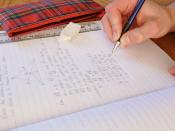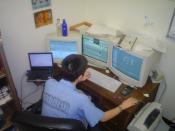Homework has historically been given to students to reinforce what they learn at school, and ultimately to help them learn the material better. However, too much homework is not helpful, and can be counterproductive. Excessive amounts of time spent on completing homework can take away from a kid's social life, family time, and limits participation in sports or other activities. The amount of homework a teacher can give to a student should be restricted, and only assigned due to necessity.
Critically acclaimed author Tamim Ansary reports that since 1981, the amount of homework given to the average sixth grader has increased by more than fifty percent. Many people claim that the increase in homework dates as far back as 1957, when the Russians launched Sputnik into outer space. The new competition that resulted served as incentive for schools to try to increase the difficulty of the curriculum. With harder classes came more homework (Ansary).
Many teachers defend large amounts of homework, claiming that it helps prepare students for a world that is becoming increasingly competitive. However, Dr. Kralovec, author of The End of Homework argues that doing homework during high school has little or no effect on successful study skills of students in college. College students have only a few hours of class a week and lots of daytime hours in which to study. She says the college schedule is nowhere as grueling as in high school. In addition, the average adult does not return home from the office with three or more hours of work to complete (Kralovec).
Excessive amounts of homework can be harmful to kids both physically and mentally. A lot of homework usually means a lot of books to carry. Fifty-five percent of the Massachusetts children surveyed by researchers at Simmons College carry loads heavier than fifteen percent of their body weight, the suggested limit. Carrying large amounts of weight daily at a young age can do a lot of damage because bones are still in development. The U.S. Consumer Product Safety Commission has reported that in 1999, more than 800 kids were treated in emergency rooms for backpack-related injuries. Many of these injuries can lead to serious problems later in life including chronic shoulder, neck, and back pain ("Children").
The large amount of homework is causing kids in both high school and junior high school to be up until midnight or later. When extracurricular activities such as sports, clubs, etc., are added to the picture, kids may even have to wake up early the next morning to finish their homework, leaving them with an insufficient amount of sleep. Some parents and teachers argue that it would be beneficial to a child's academics to limit after school activities. However, cutting back on the few hours a week teenagers use for exercise could be a factor in the growing obesity rates (Igo).
The number of children who are overweight has doubled in the last two to three decades; currently one child in five is overweight. These children are faced with even more problems in school than homework. Instead of learning and concentrating on their work, many children are teased and end up developing low self-esteem and even depression. The factors in this growing rate are most certainly due to the lack of movement occurring in today's children. With more and more homework being assigned, kids simply do not have enough time for the proper amount of exercise (Torgan).
Homework also takes away from time that a kid could be spending with his or her family. Rather than spending time bonding and building strong family relationships, parents and children argue over homework. Time is taken away from important elements of daily life. This time isparticularly precious in families with two working parents whose time with their children is limited. This time could be better spent going out to dinner as a family, or doing other activities that most families are not able to do because the kids don't have time to take a break from their homework schedule (Igo).
When "busy work" assignments are given carelessly and frequently, it causes students to lose interest in the subject. Negative results can also occur when a student is not able to complete his or her homework. Many times they will resort to copying homework, having others do their assignments, or cheating on tests. Bad habits such as these are likely to follow kids through their lives and have an effect on their moral judgment. With no consequences to these actions students will almost always take the easy way out when it comes to homework (Kralovec).
The use of homework is effective when used by the rule "less is more." Overwhelming kids with loads of homework can cause them stress and possible physical injury. Homework takes away from the small amount of time kids get to spend with their parents and siblings. A limit on their physical and social activities can also take a large toll on their lives, and could hinder their health and future relationships.
Works CitedAnsary, Tamim. "Homework: Too Much of a Good Thing?" Encarta. 2007. 10 Dec. 2007 http://encarta.msn.com/column_toomuchhomework_tamimhome/Homework_Too_Much_of_a_Good_Thing.html>.
"Children's Backpacks are Too Heavy, New Study Shows." Simmons. 12 Feb. 2001. 10 Dec. 2007 .
Igo, Shirley. "Homework: How Much is Too Much?" NPR. 13 Mar. 2003. 10 Dec. 2007 .
Kralovec, Etta. The End of Homework. Beacon P, 2000. Torgan, Carol. "Childhood Obesity." Word on Health. June 2002. 10 Dec. 2007 . Wilde, Marian. "How Much Homework is Too Much?" GreatSchools. Dec. 2007. 10 Dec. 2007 .






Good Essay!
This essay should be viewed by every teacher in the US. There simply is too much homework these days for kids to enjoy life.
Again, nice essay!
4 out of 4 people found this comment useful.